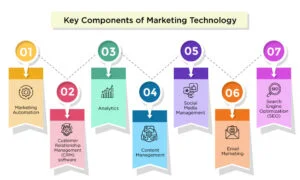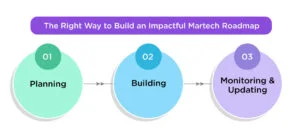MarTech, or marketing technology, is revolutionizing how companies handle their pre-sales activities today. It increases overall productivity, streamlines marketing initiatives, and maximizes consumer interaction by using tools and technologies. Businesses may accomplish their objectives more quickly with a clever martech approach, whether they are managing customer interactions, automating operations, or enhancing content.
The main components of martech, best practices for implementation, and how to design a roadmap for long-term success will all be covered in this blog. Let’s start!
What is Marketing Technology or MarTech?
Any piece of software that marketers use to carry out marketing tasks is referred to as marketing technology, or "martech." These specialized apps assist marketers with campaign planning and execution, campaign data collection and analysis, campaign performance monitoring, and, finally, the application of learnt lessons to subsequent campaigns. These activities all occur at a scale in a setting that is mostly digital, multi-touch, and multichannel.
With the aid of martech, your marketing team can produce, implement, and assess marketing campaigns and assets more efficiently, freeing up more time for creative endeavors.
Key Components of Marketing Technology
#1 Marketing Automation
Businesses may use these technologies to enhance a variety of marketing processes. By automating marketing processes, businesses may save time and money while sending more targeted and effective marketing messages to their target audience.
#2 Customer Relationship Management (CRM) software
CRM software helps businesses manage the data, correspondence, and interactions of their customers. It gives businesses valuable insights into the behavior and preferences of their customers, enabling them to create more targeted and effective marketing campaigns.
#3 Analytics
Businesses may monitor and evaluate campaign success, consumer behavior, and other important indicators with the use of analytics solutions. Businesses may pinpoint areas for development and instantly enhance their marketing efforts by evaluating this data.
#4 Content Management
Content management systems simplify online content publication and administration for businesses. By utilizing a content management system, businesses can create and distribute engaging content that speaks to their target market, which might boost traffic and conversions.
#5 Social Media Management
Solutions for social media management provide businesses command over their online presence across several social media platforms. These technologies may be used by businesses to track social media success tracking, audience engagement, and content planning and production.
#6 Email Marketing
Email marketing tools may be used by businesses to develop and distribute email campaigns tailored to certain audiences. Personalized and relevant information may be sent to subscribers using these technologies, which can help businesses boost engagement and conversions.
#7 Search Engine Optimization (SEO)
Businesses may optimize their websites for search engines with the use of SEO tools. By using these techniques, companies may raise the visibility of their website in search engine results pages, which can increase traffic and conversions.
The Right Way to Build an Impactful MarTech Roadmap
Stage 1: Planning
Setting realistic deadlines, identifying stakeholders, and assigning tasks are all part of the planning process, which is essential to a successful martech roadmap. For efficient progress management, it is crucial to take into account the intricacy of the martech stack and the resources that are accessible.
Stage 2: Building
Creating a martech roadmap, coordinating strategies with business objectives, evaluating technological infrastructure, setting priorities for high-impact initiatives, and guaranteeing efficient communication for efficient execution and teamwork are all part of the building phase.
Stage 3: Monitoring and Updating
In the last stage, the martech roadmap is routinely updated and monitored to spot new trends and technologies. By incorporating important stakeholders, this methodical approach guarantees alignment with corporate goals and keeps businesses ahead of the curve by taking advantage of fresh development prospects.
3 Best Practices for Implementing Marketing Technology
1. Combining Technology Tools for Marketing
For smooth data flow, less time spent on manual data entry, mistake removal, and consistency, marketing technology solutions must be integrated. It makes data analysis easier as well. All integrations are not created on equal, though; some are easier to use or call for more technical know-how. Selecting the choice that best suits your technical capabilities and commercial goals requires careful consideration of all accessible possibilities. Additionally, keep in mind that integration costs might soon increase.
2. Maintaining Data Security and Privacy
Businesses need to secure their data since they use it to make decisions. Businesses should have people trained in best practices and employ technological platforms that adhere to data protection rules in order to secure customer privacy. Protecting sensitive data can be aided with two-factor authentication and strict access limits. Frequent system monitoring for breaches or illegal access is also necessary to identify problems early and limit any harm.
3. Developing and Assisting Your Group
Team members should receive adequate training in how to use technological tools in order to increase production and efficiency. A specialized IT helpdesk or support team, frequent training sessions or seminars, and the creation of a knowledge base or wiki may all assist achieve this. This will allow them to manage any potential technological issues and guarantee a seamless implementation of new technologies. Providing team members with resources might also assist them in resolving any potential technological problems.
Empower Your Business Through Effective MarTech Implementation!
Modern marketing techniques are dependent on new technology, which helps companies improve customer experiences, streamline processes, and provide quantifiable outcomes. Businesses can maximize the return on their martech investments by putting data security first, integrating the right technology, and making careful plans. Give your staff the training they require and stay current with emerging technologies to keep your business competitive in today's quickly changing digital economy. Try to adopt martech, and see how your marketing campaigns succeed!
For more insightful content, visit us at KnowledgeNile.
You May Also Like:
7 Marketing Strategies to Boost Your Online Store’s Credibility
Digital Out-of-Home (DOOH) Advertising: Data-Driven Strategies for Effective Marketing







